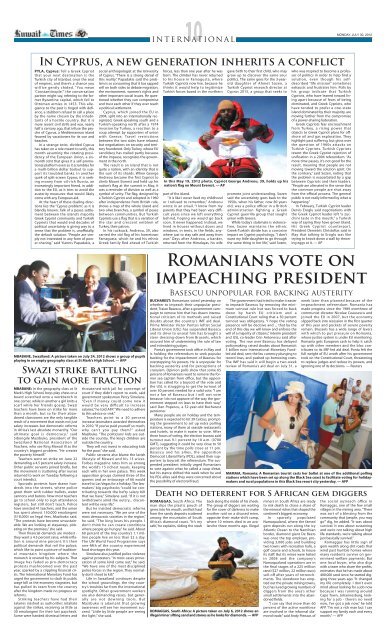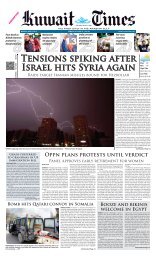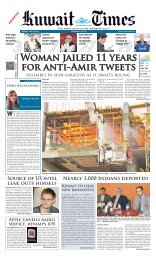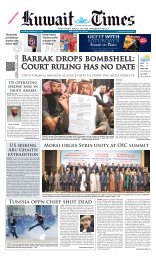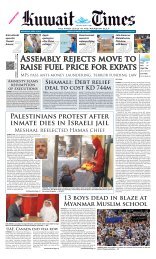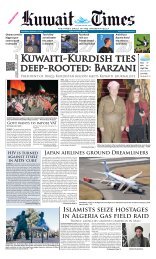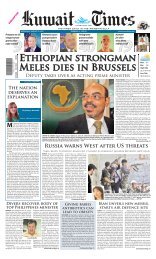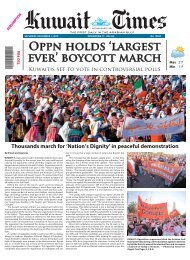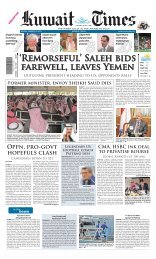UAE widENS cRAckdOwN; MORE ISlAMiStS ... - Kuwait Times
UAE widENS cRAckdOwN; MORE ISlAMiStS ... - Kuwait Times
UAE widENS cRAckdOwN; MORE ISlAMiStS ... - Kuwait Times
You also want an ePaper? Increase the reach of your titles
YUMPU automatically turns print PDFs into web optimized ePapers that Google loves.
INTERNATIONAL<br />
In Cyprus, a new generation inherits a conflict<br />
PYLA, Cyprus: Tell a Greek Cypriot<br />
that your next destination is the<br />
Turkish city of Istanbul, once the seat<br />
of empires, and there’s a chance you<br />
will be gently chided. “You mean<br />
‘Constantinople,’” the conversation<br />
partner might say, referring to the former<br />
Byzantine capital, which fell to<br />
Ottoman armies in 1453. This allegiance<br />
to the past is tinged with defiance,<br />
a stubborn refusal to call a place<br />
by the name chosen by the inhabitants<br />
of a hostile country. But it is<br />
more recent civil strife and war, nearly<br />
half a century ago, that infuse the psyche<br />
of Cyprus, a Mediterranean island<br />
favored by vacationers for its sun and<br />
beaches.<br />
In a strange twist, divided Cyprus<br />
has taken on a role meant to unify, this<br />
month assuming the rotating presidency<br />
of the European Union, a sixmonth<br />
stint that gives it a self-promotional<br />
platform even as it scrambles for<br />
a multi-billion dollar bailout to support<br />
its troubled banks. In another<br />
quirk of split-screen Cyprus, it is seeking<br />
money from oil-rich Russia, an<br />
increasingly important friend, in addition<br />
to the EU, as it tries to avoid the<br />
austerity measures that would likely<br />
come with any European aid.<br />
At the heart of these dueling directions<br />
lies the “Cyprus problem”, as it is<br />
blandly known. Talk of a peace settlement<br />
between the island’s majority<br />
Greek Cypriot community and Turkish<br />
Cypriots that would end decades of<br />
political uncertainty is giving way to a<br />
sense that the problem is, unofficially,<br />
the default solution. “People are simply<br />
not interested in any form of power-sharing,”<br />
said Yiannis Papadakis, a<br />
social anthropologist at the University<br />
of Cyprus. “There is a strong denial of<br />
this reality.” Papadakis said the problem<br />
is so consuming that it has sapped<br />
will on both sides to debate migration,<br />
the environment, women’s rights and<br />
other important social issues. He questioned<br />
whether they can compromise<br />
and trust each other if they ever reach<br />
a political settlement.<br />
Cyprus, which joined the EU in<br />
2004, split into an internationally recognized,<br />
Greek-speaking south and a<br />
Turkish-speaking north after a 1974<br />
invasion by Turkey, a reaction to a<br />
coup attempt by supporters of union<br />
with Greece. Travel restrictions<br />
between the two sides have relaxed,<br />
but negotiations on security and territory<br />
foundered. Only Turkey, whose EU<br />
candidacy has stalled partly because<br />
of the impasse, recognizes the government<br />
in the north.<br />
The result is an island that is not<br />
quite a nation, with an identity that is<br />
the sum of its shards. When George<br />
Andreou became the first Cypriot to<br />
climb Mount Everest and held up his<br />
nation’s flag at the summit in May, it<br />
was a reminder of division as well as a<br />
symbol of unity. The flag, designed by<br />
a Turkish Cypriot and adopted in 1960<br />
after independence from British rule,<br />
shows a map of the whole island and<br />
two olive branches, a symbol of peace<br />
between communities. But Turkish<br />
Cypriots use a flag that is a variation of<br />
the star and crescent emblem of<br />
Turkey, their patron.<br />
In his rucksack, Andreou, 39, also<br />
carried the old flag of his hometown<br />
Famagusta, which he and his ethnic<br />
Greek family fled ahead of Turkish<br />
MBABANE, Swaziland: A picture taken on July 24, 2012 shows a group of pupils<br />
playing in an empty geography class at St Mark’s High School. — AFP<br />
Swazi strike battling<br />
to gain more traction<br />
MBABANE: In the geography class at St<br />
Mark’s High School, boys play chess on a<br />
board scratched onto a workbench in<br />
one corner, while in another a girl knits a<br />
scarf while her friends gossip. Swazi<br />
teachers have been on strike for more<br />
than a month, but so far their abandoned<br />
classrooms are the only tangible<br />
result of a movement that wants not just<br />
salary increases but democratic reforms<br />
in Africa’s last absolute monarchy. “Our<br />
ultimate goal is democracy,” said<br />
Sibongile Mazibuko, president of the<br />
Swaziland National Association of<br />
Teachers, who see King Mswati III as the<br />
country’s biggest problem. “He creates<br />
the poverty himself.”<br />
Teachers went on strike on June 22<br />
demanding a 4.5 percent salary increase.<br />
Other public servants joined briefly, but<br />
the movement is stuttering after nurses<br />
returned to work on Tuesday following a<br />
court interdict.<br />
Sporadic protests have drawn hundreds<br />
into the streets, where police<br />
greet them with rubber bullets, water<br />
cannons and batons. Now most teachers<br />
go to school only to sign attendance<br />
registers, but still don’t teach. Police<br />
have arrested 41 teachers, and the union<br />
has spent almost 150,000 emalangeni<br />
($18,000) on legal fees, Mazibuko said.<br />
“The protests have become unsustainable.<br />
We are looking at stayaways, picketing<br />
on the premises,” she said.<br />
Their financial demands are modest -<br />
they want a 4.5 percent raise, while inflation<br />
is around nine percent. It’s their<br />
political demands that roil the palace,<br />
which like to paint a picture of traditional<br />
mountain kingdom where the<br />
monarch is revered by his subjects. That<br />
image has faded as pro-democracy<br />
protests mushroomed over the past<br />
year, sparked by a crippling financial crisis.<br />
The International Monetary Fund has<br />
urged the government to slash its public<br />
wage bill as the economy stagnates, but<br />
has pulled its team from the country<br />
after the kingdom made no progress on<br />
reforms.<br />
Striking teachers have had their<br />
salaries slashed as authorities retaliate<br />
against the strikes, receiving as little as<br />
30 emalangeni for their last paycheck.<br />
Some were handed dismissal letters and<br />
threatened with jail for contempt of<br />
court if they didn’t report to work, said<br />
government spokesman Percy Simelane.<br />
“Even if money could come now it<br />
would be very difficult to increase<br />
salaries,” he told AFP. “We need to adhere<br />
to this advice or sink.”<br />
Teachers point to a 30 percent<br />
increase lawmakers awarded themselves<br />
in 2010. “If you’ve paid yourself so much,<br />
why can’t you pay them?” asked<br />
Mazibuko. “The politicians’ kids are outside<br />
the country. The king’s children are<br />
outside the country.<br />
They will not invest in educating kids<br />
for the poor,” she said.<br />
Public servants also blame the lavish<br />
lifestyle of Mswati and his 13 wives.<br />
Forbes magazine rates him as among<br />
the world’s 15 richest royals, keeping<br />
each wife in her own palace. This week<br />
opposition groups claimed three of the<br />
queens and an entourage of 66 would<br />
travel to Las Vegas for a holiday. The lawmakers’<br />
big paychecks “could be contributing<br />
towards the hefty salary bill<br />
that we have,” Simelane said. “If it is not<br />
(withdrawn) amid the outcry... discontent<br />
will be very rife.”<br />
But he insisted democratic reforms<br />
were not necessary. “We are one of the<br />
most democratic societies in the region,”<br />
he said. “The king loves his people. I<br />
don’t think he can create conditions<br />
where people go hungry,” he said. About<br />
60 percent of the tiny country’s 1.1 million<br />
people live on less than $2 a day.<br />
The UN World Food Programme says<br />
one-fifth of the country experienced<br />
food shortages this year.<br />
Simelane also justified police violence<br />
against protesters. “In most cases provocation<br />
of some kind came out,” he said.<br />
“We have one of the most disciplined<br />
police forces in the region. They normally<br />
don’t shoot to kill.”<br />
Life in Swaziland continues despite<br />
the school groundings, the tiny country’s<br />
troubles far from the international<br />
spotlight. Other government workers<br />
are also demanding raises, but generally<br />
are not downing tools. But<br />
Mazibuko is adamant that growing<br />
awareness will see her movement succeed.<br />
“Little by little people are seeing<br />
the light,” she said.<br />
forces, less than one year after he was<br />
born. The climber has never returned<br />
to his house in Famagusta, where<br />
Turkish Cypriots now live, because he<br />
thinks it would help to legitimize<br />
Turkish forces based in the northern<br />
part of the island.<br />
“It is like I never lived my childhood<br />
or I refused to remember,” Andreou<br />
wrote in an email. “I know from my<br />
parents that they had been very difficult<br />
years since we left everything<br />
behind, hoping we would go back<br />
soon. It never happened. Instead, we<br />
lived in houses without doors and<br />
windows, in tents, in the fields, anywhere<br />
just to stay safe and away from<br />
war.” Days after Andreou, a banker,<br />
returned from the Himalayas, his wife<br />
gave birth to their first child, who may<br />
grow up to discover the same sour<br />
politics. The same goes for the 3-yearold<br />
daughter of Ahmet Sozen, a<br />
Turkish Cypriot research director at<br />
Cyprus 2015, a group that seeks to<br />
In this May 19, 2012 photo, Cypriot George Andreou, 39, holds up his<br />
nation’s flag on Mount Everest. — AP<br />
BUCHAREST: Romanians voted yesterday on<br />
whether to impeach their unpopular president,<br />
Traian Basescu, after a government campaign<br />
to remove him that has drawn international<br />
criticism of its methods and raised<br />
doubts about the country’s IMF aid deal.<br />
Prime Minister Victor Ponta’s leftist Social<br />
Liberal Union (USL) has suspended Basescu<br />
and its drive to unseat him has brought a<br />
stern dressing-down from Brussels, which<br />
accused him of undermining the rule of law<br />
and intimidating judges.<br />
Ponta’s government took office in May and<br />
is holding the referendum to seek popular<br />
backing for the impeachment of Basescu for<br />
overstepping his powers. He is unpopular for<br />
backing austerity and for perceptions of<br />
cronyism. Opinion polls show that some 65<br />
percent of Romanians want to remove the former<br />
sea captain from office, but the opposition<br />
has called for a boycott of the vote and<br />
the USL is struggling to get the turnout of<br />
over 50 percent needed for a valid vote. “I am<br />
not a fan of Basescu but I will not vote<br />
because I do not approve of the way the government<br />
stepped on laws to have their way,”<br />
said Dan Popescu, a 52-year-old Bucharest<br />
pensioner.<br />
Many people are on holiday and the temperature<br />
is expected to hit 39 Celcius, prompting<br />
the government to set up extra polling<br />
stations, many of them at seaside restaurants<br />
and hotels, to make it easier to vote. After<br />
three hours of voting, the election bureau said<br />
turnout was 9.1 percent by 10 a.m. (0700<br />
GMT), suggesting it could be very close to 50<br />
percent by the time polls close at 11 pm.<br />
Basescu and his allies, the opposition<br />
Democrat Liberal Party (PDL), asked their supporters<br />
to boycott the referendum. The suspended<br />
president initially urged Romanians<br />
to vote against what he called a coup d’etat,<br />
but his stance shifted this week when he and<br />
his PDL allies said they were concerned about<br />
the possibility of electoral fraud.<br />
promote joint understanding. Sozen<br />
said the uncertainty goes back to the<br />
1950s, when his father, now 80 years<br />
old, was a police officer in a British<br />
administration fighting a Greek<br />
Cypriot guerrilla group that sought<br />
union with Greece.<br />
While today’s stalemate is violencefree,<br />
Sozen maintains the ethnic<br />
Greek-Turkish divide has a corrosive<br />
impact on Cypriot psychology. “I don’t<br />
want my little daughter to go through<br />
the same thing in her life,” said Sozen,<br />
The government had tried to make it easier<br />
to impeach Basescu by removing the minimum<br />
turnout rule but was forced to back<br />
down by harsh EU criticism and a<br />
Constitutional Court ruling that a 50 percent<br />
turnout was obligatory. “I hope the voting<br />
presence will be decisive and ... that by the<br />
end of this day we will know and enforce the<br />
will of a majority of citizens,” interim president<br />
and USL co-leader Crin Antonescu said after<br />
voting. The row over Basescu has delayed<br />
policymaking, raised doubts about Romania’s<br />
5 billion euro International Monetary Fundled<br />
aid deal, sent the leu currency plunging to<br />
record lows, and pushed up borrowing costs.<br />
The IMF has said it will begin a two-week<br />
review of Romania’s aid deal on July 31, a<br />
who was inspired to become a professor<br />
of politics in order to help find a<br />
solution, even though his selfdescribed<br />
“life mission” sometimes<br />
exhausts and frustrates him. Polls by<br />
his group indicate that Turkish<br />
Cypriots, who have leaned toward living<br />
apart because of fears of being<br />
dominated, and Greek Cypriots, who<br />
have tended to prefer a one-state<br />
island dominated by their majority, are<br />
moving further from the compromise<br />
of a power-sharing federation.<br />
Greek Cypriots fear encroachment<br />
from Turkey, a rising power that<br />
objects to Greek Cypriot plans for offshore<br />
oil and gas exploration. They<br />
highlight past suffering, but gloss over<br />
the question of 1960s attacks on<br />
Turkish Cypriots. Turkish Cypriots<br />
resent the Greek Cypriot rejection of<br />
unification in a 2004 referendum. “As<br />
more time passes, it’s not good for the<br />
result, meaning that people are not<br />
moving toward the solution spirit. On<br />
the contrary,” said Sozen, noting that<br />
the problem is exacerbated by a gap<br />
between Cypriots and their leaders.<br />
“People are alienated in the sense that<br />
the common people are shut away<br />
from the official process. The general<br />
public is not really informed by what is<br />
happening.”<br />
In February, Turkish Cypriot leader<br />
Dervis Eroglu said negotiations with<br />
the Greek Cypriot leader left “a zucchini<br />
taste in the mouth,” a Turkish<br />
way of saying they have grown bland.<br />
His Greek Cypriot counterpart,<br />
President Demetris Christofias said in<br />
May that talking to Eroglu was like<br />
trying to knock down a wall by throwing<br />
eggs at it. — AP<br />
MONDAY, JULY 30, 2012<br />
Romanians vote on<br />
impeaching president<br />
Basescu unpopular for backing austerity<br />
KOMAGGAS, South Africa: The<br />
man slips the plastic pouch of<br />
gems into his mouth, an illicit haul<br />
from the sandy deposits scattered<br />
among the mountains of South<br />
Africa’s diamond coast. “It’s my<br />
safe,” he explains, sliding the stash<br />
week later than planned because of the<br />
impeachment referendum. Romania has<br />
made progress since the 1989 overthrow of<br />
communist dictator Nicolae Ceausescu and<br />
joined the EU in 2007, but the economy<br />
slipped back into recession in the first quarter<br />
of this year and pockets of severe poverty<br />
remain. Brussels has a wide range of levers<br />
with which to put pressure on Romania,<br />
whose justice system is under EU monitoring.<br />
Romania gets European cash to help it catch<br />
up with other members and the bloc contributes<br />
to its IMF-led aid deal. Ponta felt the<br />
full weight of EU wrath after his government<br />
took on the Constitutional Court, threatening<br />
to replace judges and reduce its powers, and<br />
ignoring one of its decisions. — Reuters<br />
MAMAIA, Romania: A Romanian tourist casts her ballot at one of the additional polling<br />
stations which have been set up along the Black Sea coast to facilitate voting for holidaymakers<br />
and rural populations in this Black Sea resort city yesterday. — AFP<br />
Death no deterrent for S African gem diggers<br />
back along the inside of his cheek.<br />
The group of diggers are waiting<br />
for the cover of darkness to make<br />
another raid on a disused mine,<br />
opposite their make-shift camp,<br />
where 10 miners died in an avalanche<br />
three months ago. Illegal<br />
KOMAGGAS, South Africa: A picture taken on July 6, 2012 shows an<br />
illegal miner sifting sand and stones as he looks for diamonds. — AFP<br />
miners in South Africa are ready<br />
to risk death to chase a share of<br />
the mineral riches that shaped the<br />
continent’s biggest economy.<br />
In sparsely populated<br />
Namaqualand, where the famed<br />
gem deposits run along the icy<br />
Atlantic Ocean to the Namibian<br />
border, diamond giant De Beers<br />
was once the top employer, providing<br />
3,000 jobs and building<br />
two towns with recreation halls, a<br />
golf course and schools, to house<br />
its staff. But its mines were halted<br />
in 2008 and the company’s<br />
Namaqualand operations are in<br />
the final stages of a 225 million<br />
rand ($27 million, 22 million euro)<br />
sell-off after years of retrenchments.<br />
The slowdown has emptied<br />
out the private mining towns,<br />
but has lured growing numbers of<br />
diggers from the area’s other<br />
small settlements into the abandoned<br />
fields.<br />
“I can say that more than 60<br />
percent of the active workforce<br />
are involved in the informal diamond<br />
trade,” said Andy Pienaar, of<br />
the social outreach office in<br />
Komaggas, one of the few small<br />
villages in the mining area. “There<br />
was sort of a blessing from the<br />
community that ‘people, you may<br />
go’” dig, he added. “It was about<br />
survival. It was about sustaining<br />
and we’re not talking about high<br />
life standards, we’re talking about<br />
just basically survival.”<br />
Komaggas has little sign of<br />
gem wealth along dirt roads that<br />
wind past humble homes where<br />
many residents survive on government<br />
welfare payments. But<br />
one local buyer, who also digs<br />
with a team who share the profits,<br />
estimates that he has made about<br />
400,000 rand since he started digging<br />
three years ago. “It changed<br />
my life completely. I don’t even<br />
mind about looking for a job now<br />
because I was running around<br />
Cape Town, Johannesburg, looking<br />
for a job - there’s no need<br />
now, I’ve got a job now,” he told<br />
AFP. “I’m not a rich man but I can<br />
support my family each and every<br />
month.” — AFP


